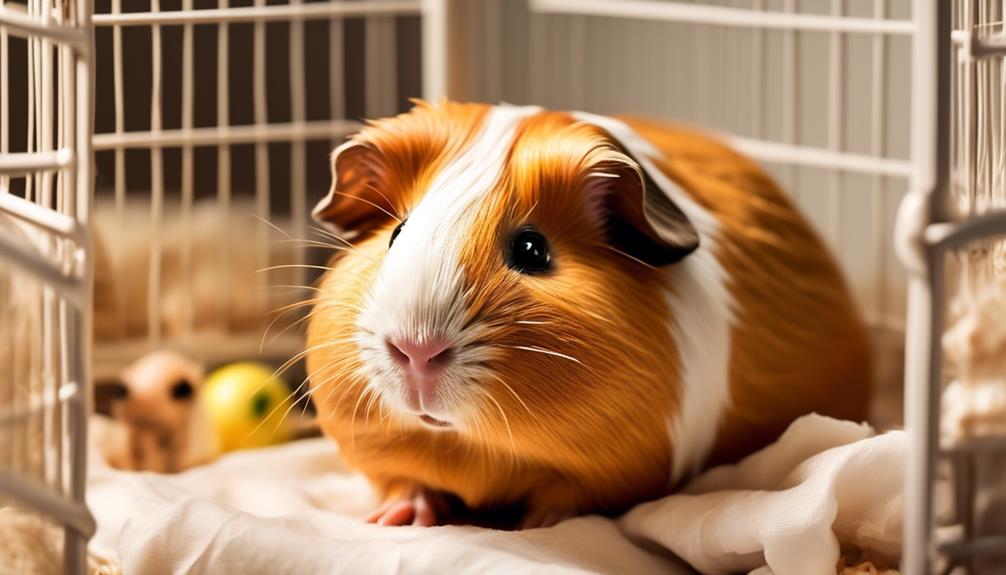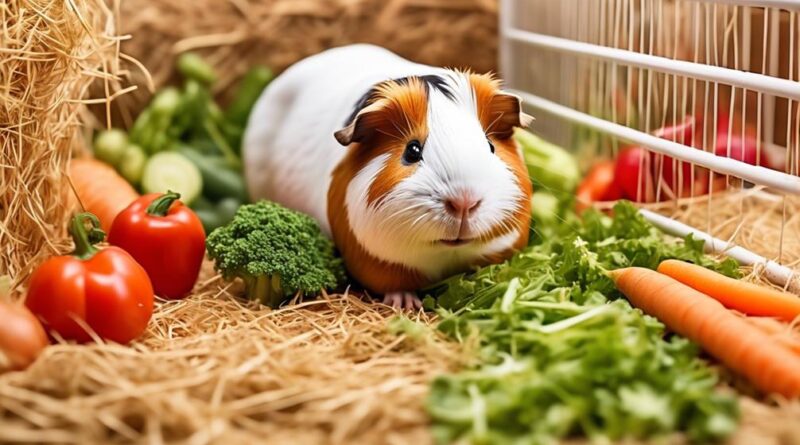3 Essential Tips for Guinea Pig Health Maintenance
You may think guinea pigs are low-maintenance pets, but ensuring their well-being requires more attention than you might expect. While these little creatures are undeniably adorable and make great companions, there are three essential tips you must consider to maintain their health and happiness.
These tips not only contribute to their overall well-being but also help prevent common health issues that guinea pigs are prone to. By implementing these tips, you can ensure that your guinea pig lives a long and healthy life.
Proper Diet and Nutrition
To ensure your guinea pig's optimal health, it's essential to provide a well-balanced diet with a variety of fresh vegetables and high-quality hay. When it comes to hay, there are several nutritious options to consider.
Timothy hay is an excellent choice as it's high in fiber and low in calcium, making it ideal for guinea pigs of all ages. Orchard grass hay and meadow hay are also nutritious alternatives that provide essential nutrients and promote dental health.
Make sure to offer a constant supply of hay to support your guinea pig's digestive system and keep their teeth worn down.
In addition to hay, vitamin supplementation is essential for your guinea pig's overall well-being. Guinea pigs require a diet rich in vitamin C, as they're unable to produce this vitamin on their own.
Including vitamin C-rich vegetables such as bell peppers, kale, and broccoli in their diet is crucial. However, to ensure they receive an adequate amount of this vital nutrient, consider providing a vitamin C supplement specifically formulated for guinea pigs.
These supplements come in various forms, including water additives and chewable tablets, making it easy to find an option that suits your guinea pig's preferences.
Clean and Safe Environment
Ensuring a clean and safe environment is crucial for maintaining your guinea pig's health and well-being. Proper cage setup and hygiene practices are essential in creating a healthy space for your guinea pig to thrive.
Here are some tips to help you maintain a clean and safe environment for your furry friend:
- Cage Setup
- Provide an adequately sized cage to allow your guinea pig to move around freely. A general rule of thumb is to have a minimum of 7.5 square feet of space for one guinea pig, with additional space for each additional guinea pig.
- Use a solid-bottom cage to prevent foot injuries. Bed the cage with appropriate bedding material, such as hay or paper-based bedding, and ensure it's changed regularly to maintain cleanliness.
- Hygiene Practices
- Clean the cage regularly, removing any uneaten food, soiled bedding, and droppings. Spot clean the cage daily and perform a thorough cleaning at least once a week.
- Maintain good air quality by ensuring proper ventilation in the cage area. Avoid exposing your guinea pig to drafts or direct sunlight, as they're sensitive to temperature changes.
Regular Veterinary Check-ups
Scheduling regular veterinary check-ups is essential to ensure your guinea pig's ongoing health and well-being. Preventive care is crucial in maintaining your furry friend's health, and wellness exams play a pivotal role in this. During these routine visits, the veterinarian will conduct thorough health monitoring, which can help in identifying any potential issues early on. These check-ups also allow the vet to evaluate your guinea pig's vaccination schedule and ensure that they're up to date with all necessary immunizations to protect them from common illnesses.
Regular veterinary check-ups provide an opportunity for the vet to assess your guinea pig's overall health and detect any underlying problems that mightn't be immediately apparent. This proactive approach can help in preventing any potential health issues from escalating and ensure that your guinea pig remains healthy and happy.
In addition to physical examinations, these visits also enable the vet to provide guidance on proper nutrition, dental care, and any specific needs based on your guinea pig's age and breed. By staying proactive with regular check-ups, you're taking a significant step in providing your guinea pig with the best possible care.
Exercise and Playtime
Regular veterinary check-ups ensure that your guinea pig is healthy and fit, allowing you to focus on incorporating exercise and playtime into their routine for overall well-being. Exercise and playtime are essential for keeping your guinea pig mentally and physically stimulated, promoting a happy and healthy life.
Here are some key ways to ensure your guinea pig gets the exercise and playtime they need:
- Enrichment Activities for Mental Stimulation
- Introduce puzzle feeders or hiding treats around their play area to encourage natural foraging behaviors, keeping their minds active and engaged.
- Rotate their toys regularly to prevent boredom and provide new challenges, such as chew toys and tunnels for exploration.
- Social Interaction for Companionship
- Arrange playdates with other guinea pigs to provide social interaction and companionship, as they're social animals and enjoy the company of their own kind.
- Spend quality time with your guinea pig every day, talking to them and gently petting them to build trust and strengthen your bond.
Dental Care and Hygiene
To maintain your guinea pig's overall health and well-being, ensuring proper dental care and hygiene is essential.
Proper chewing is crucial for your guinea pig's dental health. Their teeth are continuously growing, and the act of chewing helps wear down their teeth to prevent overgrowth and dental issues. Providing them with ample hay and chew toys will encourage natural chewing behavior, helping to maintain their dental health.
In addition to proper chewing, maintaining good oral hygiene is also important. Regularly check your guinea pig's teeth and gums for any signs of overgrowth, malocclusion, or other dental problems. If you notice any abnormalities, it's essential to seek veterinary care promptly. Furthermore, providing a balanced diet rich in Vitamin C and fiber is beneficial for their dental health.
It's important to be mindful of any changes in your guinea pig's eating habits, as dental issues can lead to decreased appetite and weight loss. If you observe any reluctance to eat or difficulty eating, it could be a sign of dental problems, and you should consult a veterinarian.
Stress Management
Feeling overwhelmed by stress can negatively impact your guinea pig's health and well-being. It's important to actively manage and reduce stress in your pet's environment to ensure their overall health. Here are some essential tips for stress management:
- Relaxation Techniques
- *Massage*: Gentle petting and massage can help relax your guinea pig and reduce stress. Use slow, gentle strokes to massage their back and sides, and observe their response to ensure they enjoy it.
- *Quiet Time*: Create a peaceful environment by providing a quiet and dimly lit space for your guinea pig to retreat to when they need a break from noise and activity.
- Behavioral Enrichment
- *Toys and Activities*: Provide a variety of toys and activities to keep your guinea pig mentally stimulated. Items such as tunnels, chew toys, and puzzle feeders can help alleviate boredom and reduce stress.
- *Social Interaction*: Guinea pigs are social animals and benefit from interaction with their human companions and other guinea pigs. Encourage positive socialization to help reduce their stress levels.
Parasite Prevention

Parasite prevention is crucial for maintaining your guinea pig's health and well-being. External parasites prevention is essential to keep your guinea pig free from pests like mites and lice. Regularly inspect your guinea pig's fur and skin for any signs of infestation, such as excessive scratching, hair loss, or visible parasites. If you notice any issues, consult with a veterinarian to address the problem promptly. Additionally, keeping your guinea pig's living environment clean and sanitary can help prevent external parasites from taking hold.
Internal parasites control is equally important for your guinea pig's health. Regular veterinary check-ups can help detect internal parasites early on, allowing for prompt treatment. Your veterinarian may recommend periodic fecal examinations to check for internal parasites such as worms. Additionally, maintaining good hygiene practices, providing a balanced diet, and ensuring access to fresh, clean water can also contribute to internal parasite prevention.
To further prevent both external and internal parasites, it's crucial to keep your guinea pig's living area clean and hygienic. Regularly clean the cage, bedding, and any accessories, and provide fresh hay and clean water daily. Proper hygiene and preventive care are key to keeping your guinea pig healthy and free from parasites.
Monitoring Signs of Illness
Regularly monitor your guinea pig for any changes in behavior, appetite, or physical condition as these could be early signs of illness. Pay attention to the following:
- Temperature Regulation
- Ensure the living environment is kept within the recommended temperature range of 65-75°F (18-24°C). Sudden changes in temperature can stress your guinea pig, making them more susceptible to illness.
- Place the cage away from drafty areas and direct sunlight to prevent overheating or chilling.
- Behavior Observation
- Observe your guinea pig's activity level. A sudden decrease in activity or reluctance to move could indicate pain or illness. Conversely, excessive restlessness or agitation may also be a sign of distress.
- Monitor eating and drinking habits. Any significant changes, such as a sudden loss of appetite or increased thirst, should be noted and reported to a veterinarian.
Frequently Asked Questions
How Can I Help My Guinea Pig With Socialization and Mental Stimulation?
To help your guinea pig with socialization and mental stimulation, try enrichment activities like providing tunnels and toys, and bonding exercises such as gentle handling and spending quality time together. These techniques can improve their overall well-being.
Can I Use Essential Oils or Scented Products Around My Guinea Pig's Environment?
You shouldn't use essential oils or scented products around your guinea pig's environment. Essential oil safety for pets is important, and scented products can cause respiratory issues. Keep their living area free from these to ensure their health.
What Are Some Common Behavioral Signs of Stress in Guinea Pigs?
You can recognize stress in guinea pigs through behaviors like teeth chattering, excessive hiding, and loss of appetite. To calm them, provide a quiet and secure environment, gentle handling, and enriching activities.
Are There Any Natural Remedies or Supplements That Can Support My Guinea Pig's Overall Health?
You can support your guinea pig's health by incorporating herbal supplements into their dietary requirements. Natural remedies like chamomile and nettle can provide essential nutrients and promote overall well-being for your little friend.
How Can I Safely Trim My Guinea Pig's Nails at Home?
To safely trim your guinea pig's nails at home, proper handling is essential. Use gentle pressure to hold the paw, and carefully trim the nails using specialized small animal nail clippers. Learn proper nail trimming techniques to avoid injury.
Conclusion
So, remember to give your guinea pig a balanced diet. Keep their environment clean and safe. Schedule regular check-ups with the vet.
Don't forget to make time for play and exercise. Keep an eye out for any signs of illness or stress.
By following these essential tips, you can help ensure your guinea pig stays healthy and happy for years to come.
